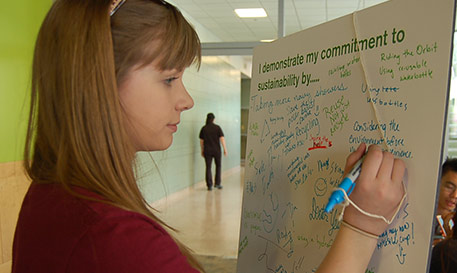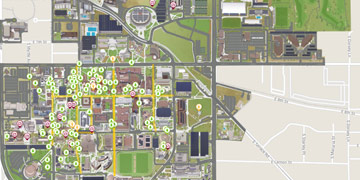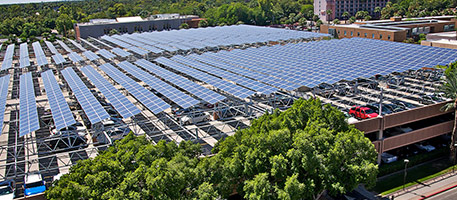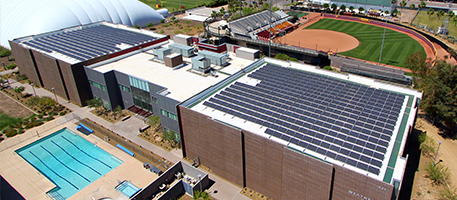Sustainability Operations and Practices
Arizona State University is a model for sustainability operations and practices around the country and has made significant strides in several key areas. Through eight overarching sustainability goals – circular resources, climate positive, collaborative action, community success, food reconnection, optimized water, personal action, and resilience – ASU takes seriously its commitment to solving the climate.
ASU has made significant strides in its sustainability goals over the past year. Our latest Sustainability Operations Annual Review reflects some of the high points we have achieved to date. View the Annual Review and take a moment to read about what ASU is doing.
What ASU is Doing

ASU recognizes that sustainability begins internally with its own business practices and policies.
What You Can Do at ASU
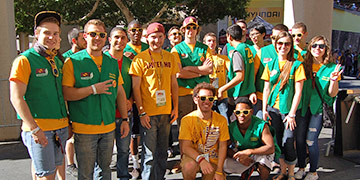
Students, faculty and staff across the university are making a positive impact in many ways.
Our Sustainable Commitment
ASU is committed to leading the world by example to a more sustainable and resilient future by:
- achieving internal sustainability goals and related external commitments
- generating the solutions, education, engagement and research that empowers the world to achieve sustainability
ASU set four formal, aggressive internal sustainability goals in its 2011 Strategic Plan for Sustainability Operations and Practices. These goals were updated in 2017 to incorporate:
- advancements in technology and research
- convergence of university mission with operations in a living laboratory environment that extends to the broader world
- increased urgency in addressing climate change and resource depletion
- learning from the practice of implementation
Eight Critical Goals
Circular resources
A circular resource system achieves Zero Waste by adapting the goods we consume to maximize their use before sending them back into the economy for the most productive use possible.
Commitments:
- Achieve 30 percent aversion by fiscal year 2025.
- Achieve 90 percent diversion by fiscal year 2025.
- Annually increase value of diverted materials in hierarchy of reuse.
- Annually improve the aversion and re-circulation characteristics of products and services purchased.
- Develop purchasing, aversion and diversion goals and metrics that community success by Dec. 31, 2018.
Climate Positive
The goal of a university is not to have the least impact possible, but rather the greatest net positive impact possible.
Commitments:
- Achieve carbon neutrality for Scope 1 and 2 emissions by FY 2025.
- Achieve carbon neutrality for Scope 3 emissions by FY 2035.
- Develop climate-related education, research and community engagement “handprint” goals and metrics with a particular focus on social equity by Dec. 31, 2018.
Collaborative Action
Collaborative action leverages the power of University departments working together to align missions, policies, processes, programs and activities for consistency with ASU sustainability goals.
Commitments:
- Annually increase integration of sustainability practices into campus operations and functions.
- Earn and retain at least 70 percent of operations-related points in the AASHE Sustainability Tracking and Rating System by fiscal year 2019.
- Increase ASU campus community participation in cultural competency, diversity and inclusion training and events to 50 percent by fiscal year 2020.
Community Success
As a New American University measured not by whom we exclude but rather by whom we include and how they succeed, we must embrace the diversity that charter brings to improve understanding, acceptance and wellbeing of all campus community members and, thus, broader society.
Commitments:
- Integrate community success into all sustainability goals
Food reconnection
Fundamental to our health, productivity and connection with nature is a strong relationship with nutritional food, knowledge of its sources and impacts on the health of our planet.
Commitments:
- Earn and retain at least 50 percent of the points in the food- and dining-related credits of the AASHE Sustainability Tracking and Rating System by fiscal year 2020.
- Eliminate food insecurity among ASU community members by fiscal year 2020.
- Provide local, organic gardening opportunities to all university community members by fiscal year 2021.
Optimized water
Optimizing ASU’s water use involves applying a systems approach to use the right quantity and quality of water for the right purpose at the right time.
Commitments:
- Achieve 15 percent reduction in water imported to the university by fiscal year 2023.
- Incorporate university research into water and wastewater operations to harvest energy and nutrients from university effluent by fiscal year 2025.
- Incorporate university research into water and wastewater operations to develop campus community health goals, metrics and baselines by fiscal year 2019.
Personal Action
Personal Action involves the engagement of ASU students, staff and faculty community members in individual behavior that supports sustainability goals on campus and in their personal lives.
Commitments:
- Achieve comprehensive sustainability literacy by university community members by fiscal year 2021.
- Ensure students graduate with at least one sustainability learning outcome by fiscal year 2021.
- Achieve an adoption of sustainability behaviors by campus community members by fiscal year 2021.
- Achieve a culture of sustainability within the university community by fiscal year 2021.
- Motivate students to participate in sustainability-related community service opportunities.
Resilience
With climate change already impacting our mission, operations and communities we serve, we will adapt not just for resilience in the face of greater future changes, but to regenerate our environment and our surrounding communities.
Commitments:
- Develop a climate change resilience and regeneration assessment for West campus by Dec. 31, 2017.
- Develop a climate change resilience and regeneration assessments for all campuses by Dec. 31, 2018.
- Integrate resilience and regeneration goals and strategies into ASU's climate action plan by Dec. 31, 2019.
- Include evaluation and planning for equitable access to necessities (including housing, food and health services) for all community members in all resilience and regeneration assessments and plans.



